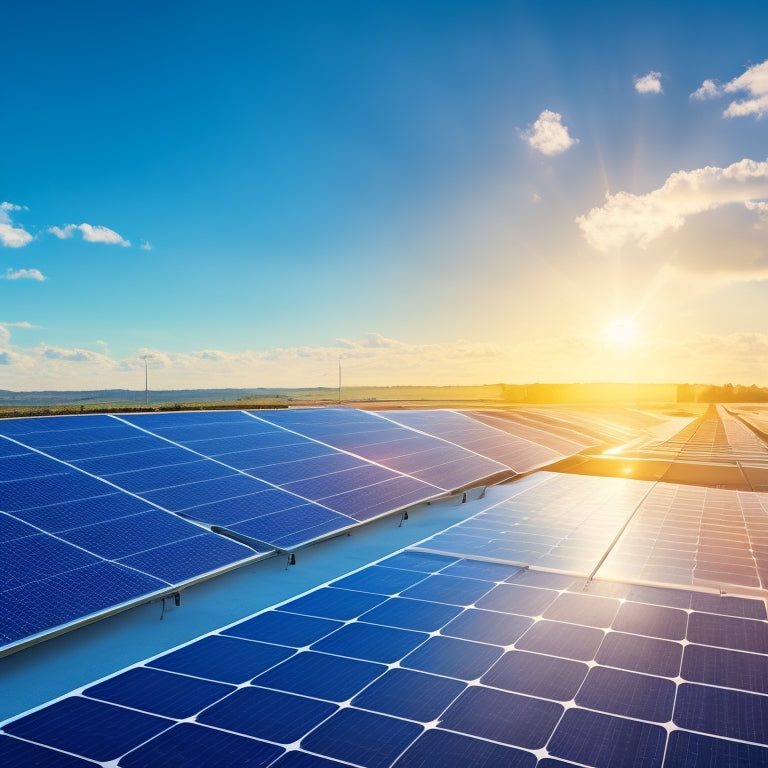
Top Rated Solar Panel Efficiency Systems Online
Share
When shopping for top-rated solar panel efficiency systems online, you'll find top-tier models boasting efficiencies from 20% to 23%, with some achieving up to 23.6%. To compare, utilize online solar panel efficiency charts and residential performance metrics like energy output and capacity factor. Review top brands like Panasonic, LG, and SunPower, considering industry certifications and warranty programs. Online calculators can estimate energy production and identify areas for improvement. By exploring these features, you'll uncover the best systems for maximizing your energy independence and savings - and discover how to optimize your system for even greater benefits.
Key Takeaways
• Online solar panel efficiency charts and comparison tools help evaluate and rank top-rated models for maximum energy production.
• Top-tier solar panels with high efficiencies (20-23.6%) maximize energy independence and reduce grid reliance.
• Industry certifications like UL and IEC ensure quality and safety assurance when choosing top solar panel brands.
• Online calculators provide accurate energy production estimates, personalized performance improvement suggestions, and CO2 emission reduction data.
• Top-rated solar panel efficiency systems online offer detailed reports on energy potential, costs, and optimization strategies for maximum savings.
Top Solar Panel Efficiency Ratings
You can expect top-tier solar panels to boast efficiencies ranging from 20% to 23%, with the highest-rated models achieving an impressive 23.6% efficiency.
As you explore the top solar panel efficiency ratings, you'll notice that these high-performance panels are designed to maximize energy production. This means you can generate more power per hour of sunlight, reducing your reliance on the grid and increasing your energy independence.
To take full advantage of these efficient solar panels, consider combining them with energy storage solutions. By storing excess energy generated during the day, you can power your home or business during the night or on cloudy days. This hybrid approach can significantly decrease your energy bills and carbon footprint.
Additionally, you may be eligible for solar incentives, such as tax credits or rebates, which can help offset the initial investment in your solar panel system. By leveraging these incentives and pairing them with high-efficiency solar panels and energy storage, you can tap into the full potential of solar power and reap the benefits of clean, renewable energy.
Online Solar Panel Efficiency Charts
As you explore online solar panel efficiency charts, you'll find that they provide a visual representation of solar panel efficiency rankings, allowing you to quickly compare the performance of different panels.
These charts typically display the efficiency ratings of various solar panels, enabling you to identify the most efficient options for your specific needs.
Solar Panel Efficiency Rankings
Ranking solar panels by their efficiency allows consumers to make informed decisions when selecting the most suitable option for their energy needs. As you explore the world of solar energy, understanding the efficiency of different panels is important in maximizing your power output. You want to make sure you're getting the most bang for your buck, after all.
To give you a better understanding of the top-rated solar panels, here are some key factors to keep in mind:
-
Efficiency ratings: Look for panels with high efficiency ratings, usually above 20%. This guarantees you're getting the most power per hour of sunlight.
-
Cost factors: While high-efficiency panels may come at a higher upfront cost, they can provide long-term savings through increased energy production.
-
Environmental impact: Take into account the environmental impact of your solar panel choice. Higher-efficiency panels often require less material and resources, reducing waste and minimizing their carbon footprint.
- Warranty and durability: A longer warranty period and durable construction can ensure your solar panels last for years to come, providing a reliable source of clean energy.
Efficiency Comparison Charts
Online solar panel efficiency charts provide a visual representation of the top-performing panels, allowing consumers to compare and contrast the efficiency ratings of various models at a glance. These charts enable you to quickly identify the most efficient solar panels on the market, making it easier to make an informed decision for your energy needs.
By comparing the energy savings of different models, you can maximize your return on investment and optimize your energy output.
In the current market trends, solar panel efficiency is a critical factor in determining the effectiveness of a solar panel system. Efficiency comparison charts help you navigate the complex landscape of solar panel options, providing a clear and concise overview of the top performers.
With this information, you can make data-driven decisions to optimize your energy savings and reduce your carbon footprint. By leveraging the insights provided by these charts, you can stay ahead of the curve and capitalize on the latest advancements in solar panel technology.
Residential Solar Panel Performance Metrics
You can evaluate the effectiveness of your residential solar panel system by tracking key performance metrics, including energy output, capacity factor, and degradation rate. These metrics provide valuable insights into your system's performance and help you identify areas for improvement.
Here are some key performance metrics to monitor:
-
Energy Savings: Track the amount of energy your solar panels produce to calculate your energy savings and assess the environmental impact of your system.
-
Panel Maintenance: Regularly inspect and maintain your solar panels to maintain peak performance and extend their lifespan.
-
Roof Orientation: Confirm that your solar panels are installed at the ideal angle and orientation to maximize energy output.
- System Sizing: Verify that your solar panel system is appropriately sized for your energy needs to avoid energy waste and maximize efficiency.
Solar Panel Efficiency Comparison Tools
To accurately assess the efficiency of different solar panel systems, utilize specialized comparison tools that provide detailed side-by-side evaluations of various models based on their performance metrics. These tools enable you to make informed decisions by comparing energy metrics such as power output, efficiency ratings, and temperature coefficients.
You can also filter results based on industry standards, such as IEC and UL certifications, to guarantee compliance with regulatory requirements.
When selecting a comparison tool, look for features that allow you to customize your search based on specific criteria, such as panel type, wattage, and manufacturer. This will enable you to narrow down your options and focus on the most suitable systems for your needs.
Additionally, consider tools that provide real-time pricing and availability information, allowing you to make the most cost-effective decision.
Best Online Solar Panel Reviews
When researching solar panels online, you'll come across various review websites that provide ratings and comparisons of different brands and models.
To make an informed decision, you need to understand how these ratings are calculated and what they mean for your specific needs.
Solar Panel Ratings Explained
Solar panel ratings, typically denoted by a percentage, quantify a panel's ability to convert sunlight into electrical energy, with higher ratings indicating greater efficiency. As you explore the market, understanding these ratings is essential for making an informed decision.
You'll want to take into account the following key factors that influence a panel's rating:
- Efficiency: The percentage of sunlight converted into electrical energy
- Temperature Coefficient: How well the panel performs in high temperatures
- Durability: The panel's ability to withstand environmental factors
- Certifications: Compliance with industry standards and government regulations
When evaluating solar panel ratings, bear in mind the current market trends and government incentives. With the increasing demand for renewable energy, manufacturers are driven to improve efficiency and reduce costs.
Government incentives, such as tax credits and rebates, can also impact the overall value of your investment. By understanding solar panel ratings and their underlying factors, you'll be better equipped to navigate the market and make a smart investment in your energy future.
Top Brands Compared
With numerous brands vying for attention, you'll want to scrutinize the top contenders, including Panasonic, LG, and SunPower, to determine which one best fits your energy needs.
Each brand boasts its unique strengths, and understanding their differences is important in making an informed decision. Panasonic is renowned for its high-efficiency panels, ideal for smaller roofs. LG, on the other hand, offers a detailed warranty program, guaranteeing long-term reliability. SunPower leads the pack regarding brand loyalty, with customers praising their exceptional customer service.
When comparing these top brands, it's crucial to consider industry standards. Look for certifications like UL (Underwriters Laboratories) and IEC (International Electrotechnical Commission) to ensure the panels meet rigorous quality and safety standards.
Additionally, check the warranty offered by each brand, as it can have a significant impact on your long-term savings. By weighing the pros and cons of each brand, you'll be able to make an informed decision that meets your energy requirements and budget.
Online Solar Panel Efficiency Calculators
You can instantly determine the efficiency of your solar panel system using online calculators that provide accurate estimates of energy production based on your location, panel type, and system size. These calculators can help you identify areas for improvement, optimize your system's performance, and maximize your Solar Savings. By inputting your system's specifications, you'll receive a detailed report outlining your energy production potential, energy costs, and carbon footprint reduction.
Here are some key benefits of using online solar panel efficiency calculators:
-
Accurate Energy Production Estimates: Get precise calculations of your system's energy output based on your location, panel type, and system size.
-
Personalized Recommendations: Receive tailored suggestions for improving your system's performance and maximizing energy production.
-
Energy Audit Insights: Identify areas of energy inefficiency and opportunities for cost savings.
- Carbon Footprint Reduction: Discover how much CO2 emissions you'll reduce by switching to solar power.
Frequently Asked Questions
Can I Install Solar Panels on a Shaded Roof?
Like a tree struggling to grow in a dense forest, your solar panel dreams may be overshadowed by a shaded roof, but don't worry, you can still harness the sun's power with careful roof orientation and shade mitigation strategies.
How Long Do Solar Panels Last on Average?
You're likely wondering how long your solar panels will last; on average, they'll degrade by 0.5-1% annually, with a 25-30 year lifespan, backed by 25-year warranty periods, ensuring your investment remains profitable for years to come.
Are Solar Panels Worth the Upfront Cost?
You'll find that solar panels are worth the upfront cost, considering you'll reap energy savings and cost benefits over time, offsetting the initial investment and granting you long-term power independence.
Can I Install Solar Panels Myself Safely?
"As you envision yourself atop your roof, screwdriver in hand, remember that DIY solar installation can be a slippery slope. Avoid DIY dilemmas by prioritizing safety precautions, ensuring a secure and efficient setup that harnesses power without compromising your well-being."
Do Solar Panels Work During Power Outages?
During power outages, you won't have energy independence with standard grid-tied solar panels, as they shut down for safety reasons. However, you can achieve grid reliability with battery-backed systems, ensuring continuous power supply during outages.
Related Posts
-

7 Best RV Battery Charging Panels for Your Adventures
You're searching for reliable and efficient solar charging solutions to power your RV battery on the go. Explore top-...
-

What Does EV Charging Station Installation Cost?
You can anticipate paying between $300 to $1,500 or more for an EV charging station installation, depending on the ty...
-

Why Home Battery Deals Are Worth Buying Online
You're buying a home battery deal online for the same reason you wouldn't buy a car without researching online first....


